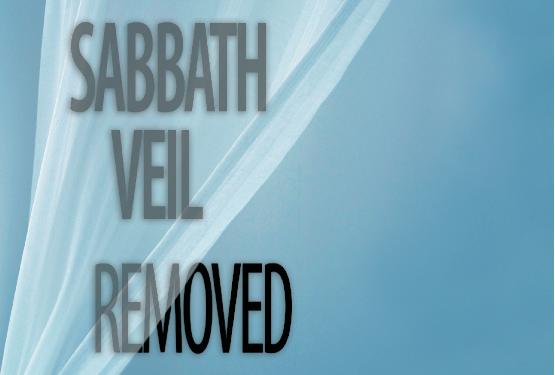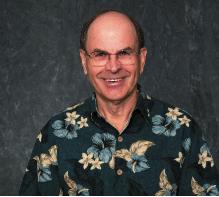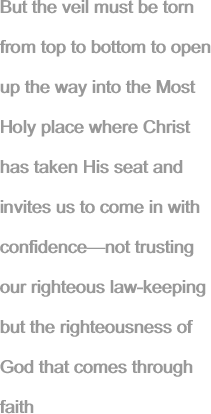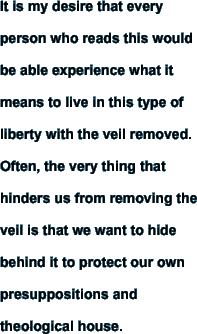 |
|
HOME | PROCLAMATION! MAGAZINE | DEVOTIONALS | STUDIES | LETTERS | ABOUT US | RELATED WEBSITES |
|
HOME / PROCLAMATION! MAGAZINE / 2009 / FALL / Sabbath veil removed
FALL 2009
VOLUME 10, ISSUE 4
A R T I C L E S

Dale Ratzlaff
After the Apostle Paul discussed the differences between the old and new covenants in
2 Corinthians 3, he made this insightful statement about the Christians who were focused on old covenant law.
"But their minds were hardened; for until this very day at the reading of the old covenant the same veil remains unlifted, because it is removed in Christ. But to this day whenever Moses is read, a veil lies over their heart; but whenever a man turns to the Lord, the veil is taken away. Now the Lord is the Spirit; and where the Spirit of the Lord is, there is liberty" (2 Cor. 3:14-17).
The many questions we were asked during our recent "Tour of Encouragement" and the many letters and emails we have received after returning have reinforced to me that one cannot see through the veil. Over and over again the same questions came up, and as we gave Bible references for what we believe to be truth, many people were not able to accept what these verses state. The Bible texts are simply brushed aside as if the verses were not there. What the Bible clearly states did not even penetrate their thinking. Often the response is, "It couldn't mean that because…" and then the questioner will bring some other "truth" in their "paradigm of truth" to which the Bible text in question disagrees. If you have read Truth Led Me Out or listened to my description of the seven-month study we did on the topic of the Sabbath you will know that I experienced the same thing in my study. I still remember the day I decided to take the texts that did not fit my paradigm at face value without trying to explain them away by my previous understanding of truth. Suddenly I saw a whole new system of truth that was beautiful, where all the pieces fit together, and Christ was at the center! The veil was removed!
Sabbath texts with which I have wrestled
I am going to give a few examples of some of the verses on the topic of the Sabbath, and have wrestled hard with each one of these myself.
Therefore no one is to act as your judge in regard to food or drink or in respect to a festival or a new moon or a Sabbath day—things which are a mere shadow of what is to come; but the substance belongs to Christ (Col. 2:16, 17).
I believe this verse has the Seventh-day Sabbath in view. It is clear beyond the shadow of doubt to me now, but there was a time when, like many of our questioners, I simply could not make it fit. I, as do the questioners now, would respond, "Well, the 'Sabbath' here must refer to the annual sabbaths as the Sabbath of the Fourth Commandment is not a shadow but an eternal, moral law." The person questioning usually has no desire even to look at the rest of the biblical evidence because he or she already believes the text cannot refer to the weekly Sabbath; if it does refer to the seventh day, it would blow their whole system of theology to pieces. In other words, they interpret a clear statement of Scripture according to their preconceived understanding. I call this mind-set "looking through the veil".
Our conclusion after our thorough study of Colossians 2:16, 17 and many other Scriptures was that the Seventh-day Sabbath is a ritual law and not a moral law. Another key verse that led us to this conclusion was John 5:16-19:
For this reason the Jews were persecuting Jesus, because He was doing these things on the Sabbath. But He answered them, "My Father is working until now, and I Myself am working." For this reason therefore the Jews were seeking all the more to kill Him, because He not only was breaking the Sabbath, but also was calling God His own Father, making Himself equal with God.
The meaning of the Greek word translated "breaking" and the Greek tense—imperfect, indicating continuous action—used here makes it quite clear that Jesus really was continually breaking the Sabbath and continually calling God His own Father. However, when we say that Christ broke the Sabbath we usually receive this response, "Well, it cannot mean Jesus broke the Sabbath because the Sabbath is an eternal, moral law, and Jesus had to keep the law. If He broke the Sabbath He could never be our Savior, so I know this is not what this text means." Again, there is not the slightest desire to study this text carefully because, based upon their theological paradigm, the Greek words and Greek tense could not mean what the Apostle John wrote.
One more illustration of the function of the law comes from several texts in Galatians:
- The Law came 430 years after Abraham (Gal. 3:17).
- The Law was added at the time of Moses (Gal. 3:19).
- The Law was to reign from Moses "until" Christ (Gal. 3:21-24).
- Now that Christ is come we are no longer under the law (Gal. 3:24, 25).
We believe the Law here refers to all the laws of the old covenant, not just the sacrificial laws. However, this idea is so foreign to those under the veil that they cannot accept what Paul states. Rather, as we have had dozens tell us, including one Adventist pastor, Paul misunderstood Christ, and one cannot accept what he teaches about the law. In other words, they would rather throw out Paul's writings as a "source of truth" than to adjust their "truth" to his statements. They just "know" that this must mean the "ceremonial law" because the Ten Commandment law, they say, is God's eternal moral law, given to Adam in the Garden of Eden, and it applies to all mankind and is the foundation of God's government. Not a thought is given to the possibility that what Paul states could be truth that should be taken at face value.
They will answer, "Then you are saying that it is OK to kill, steal and commit adultery." If we have received this comment once, we have received it a hundred times. From the many conversations we have had this summer, it appears many Adventists simply cannot separate old covenant laws from the eternal moral principles behind the laws. They see the Ten Commandments as a reflection of God's righteousness and do not realize that the new covenant moral principles are so much higher than old covenant law, including the Ten Commandments, that Jesus could contrast old covenant morality with the new, higher righteousness—the very righteousness of God which is the standard for new covenant morality.
Removing the veil
With this introduction let us go back to our starting verse in 2 Corinthians and look closely at it, for in these verses Paul gives the secret of how the blinding veil is removed.
"But their minds were hardened; for until this very day at the reading of the old covenant the same veil remains unlifted, because it is removed in Christ. But to this day whenever Moses is read, a veil lies over their heart; but whenever a man turns to the Lord, the veil is taken away. Now the Lord is the Spirit; and where the Spirit of the Lord is, there is liberty" (2 Cor. 3:14-17).
First, let us be certain as to what Paul says. Note that "the reading of the old covenant" is parallel to "whenever Moses is read". From this we can be certain that the old covenant is the Torah—the writings of Moses, including the Ten Commandments—which are the very words of the old covenant. The Sabbath, it is true, was the covenant sign for the children of Israel.
Next, we observe the veil is present when one reads the writings of Moses from the paradigm of the old covenant. However, when one turns to the Lord, that veil is taken away. When someone understands the simple, new covenant gospel which is faith in Christ without any reliance on works of any kind, that person is saved. The saving act is not faith plus keeping the commandments; it is not faith plus observing the Sabbath, nor is it faith plus anything else. Rather, it is trusting the righteousness that Christ worked out for guilty sinners on the cross by His shed blood (Rom. 3:21, 26; Gal. 2:21).
Note the result of this saving faith. Paul says that when the veil is removed, we live in a realm of "liberty". This liberty gives us the freedom to serve God from a new motive and position of complete acceptance. Read this passage again:
"But their minds were hardened; for until this very day at the reading of the old covenant the same veil remains unlifted, because it is removed in Christ. But to this day whenever Moses is read, a veil lies over their heart; but whenever a man turns to the Lord, the veil is taken away. Now the Lord is the Spirit; and where the Spirit of the Lord is, there is liberty" (2 Cor. 3:14-17).
We are now born again by the Spirit of God. We are now God's children and fully qualified to share in the inheritance of the saints in Light (Col. 1:12-14). Now, for the first time, we can worship "in spirit and in truth"(Jn. 4:23). Now the love of Christ controls us, and we seek to obey ALL the moral principles found in ALL of Scripture. Furthermore, as we "walk by the Spirit", we will not carry out the desires of the flesh (Gal. 5:16).
It is my desire that every person who reads this would be able to experience what it means to live in this type of liberty with the veil removed. Often, the very thing that hinders us from removing the veil is that we want to hide behind it to protect our own presuppositions and theological house. But the veil must be torn from top to bottom to open up the way into the Most Holy place where Christ has taken His seat and invites us to come in with confidence—not trusting our righteous law-keeping but the righteousness of God that comes through faith (Rom. 3:21, 22).
The only way this transformation can happen is if we accept the authority of Scripture and take it for what it is—the active, living word of God. It is sharp enough to discern the thoughts and intentions of our hearts (Heb. 4:12).
As we submit our minds and hearts to the very word of God, Scripture will lead us to see the Living Word—Jesus Christ—as our covenant keeper Who is able to save to the uttermost. Then we will also recognize that Christ is the central truth of Scripture, the motive for true obedience.
Sabbath in Colossians
Perhaps you are ready to look seriously at the reasons why so many hundreds, if not thousands, of former Adventists believe the Sabbath is a ritual law. Following is the biblical evidence I looked at that changed my mind from my Adventist understanding. Let us look at the Sabbath in Colossians 2:16 once more.
We believe the "Sabbaths" in Colossians 2:16 refer to the weekly Sabbaths because when the terms "festival, new moon, and Sabbath are used together in the Old Testament, they are found in either ascending or descending order:
- Days, Months, Seasons (Sabbaths, New Moons, Fixed Festivals)
- Seasons, Months, Days (Fixed Festivals, New Moons, Sabbaths)
2 Chron. 2:4: to offer burnt offerings morning and evening, on sabbaths and on new moons and on the appointed feasts of the Lord our God, this being required forever in Israel.
1 Chron. 23:31: and to offer all burnt offerings to the Lord, on the sabbaths, the new moons and the fixed festivals in the number set by the ordinance concerning them, continually before the Lord.
2 Chron. 31:3: for the morning and evening burnt offerings, and the burnt offerings for the sabbaths and for the new moons and for the fixed festivals, as it is written in the law of the Lord.
Hos. 2:11: I will also put an end to all her gaiety, Her feasts, her new moons, her sabbaths And all her festal assemblies.
Eze. 45:17: It shall be the prince's part to provide the burnt offerings, the grain offerings and the drink offerings, at the feasts, on the new moons and on the sabbaths.
Col. 2:16, 17: Therefore no one is to act as your judge in regard to food or drink or in respect to a festival or a new moon or a Sabbath day—things which are a mere shadow of what is to come; but the substance belongs to Christ.
Notice the close parallel in wording and order in the references above. Here is evidence, not assumptions or hearsay, but good biblical evidence that the "Sabbaths" in Colossians 2:16, 17 are indeed the weekly Sabbaths. I recognize that accepting this conclusion shatters the worldview of many, as it did mine. If we accept the Sabbath as a ritual law, however, and not an eternal moral law, that conclusion harmonizes perfectly with the rest of the evidence of Scripture such as John 5 and Galatians 3. One does not have to throw out Paul as a source of truth. Neither does one have to dodge or explain away dozens of other texts which undermine Adventist theology. Rather, let the Sabbath be another ritual law pointing to Christ as the true Rest of God. Let Christ and Christ alone be the only testing truth as so clearly taught in Scripture.
In summary
The Word of God—the Scriptures of the Old and New Testaments—are the only source of religious truth. The Old Testament revealed God's plan and promises, and the New Testament shows the fulfillment of those promises in the person of the Lord Jesus. Accepting Christ as our covenant keeper and our only righteousness removes the veil.
The Sabbath, then, not only points back to that first seventh day when man and God were in right relationship, but it also points forward to the "rest of God" that a person can receive the moment one places his faith in the Lord Jesus Christ. And that transforming act can happen in a moment of time—"today".
He who believes has eternal life and does not come into judgment. †
![]()
Copyright 2009 Life Assurance Ministries, Inc., Glendale, Arizona, USA. All rights reserved. Revised November 24, 2009. Contact email: proclamation@gmail.com
 Dale Ratzlaff is the founder of Life Assurance Ministries, Inc., and owns LAM Publications, LLC. He served as an Adventist pastor for 13 years, seven at Monterey Bay Academy where he taught Bible. He and his wife Carolyn left the Adventist church in 1981 when he realized he could no longer teach the investigative judgment in clear conscience. He has authored Sabbath in Christ, The Cultic Doctrine of Seventh-day Adventists, The Truth About Adventist "Truth", and Truth Led Me Out. These are available through his website, LifeAssuranceMinistries.com.
Dale Ratzlaff is the founder of Life Assurance Ministries, Inc., and owns LAM Publications, LLC. He served as an Adventist pastor for 13 years, seven at Monterey Bay Academy where he taught Bible. He and his wife Carolyn left the Adventist church in 1981 when he realized he could no longer teach the investigative judgment in clear conscience. He has authored Sabbath in Christ, The Cultic Doctrine of Seventh-day Adventists, The Truth About Adventist "Truth", and Truth Led Me Out. These are available through his website, LifeAssuranceMinistries.com.

